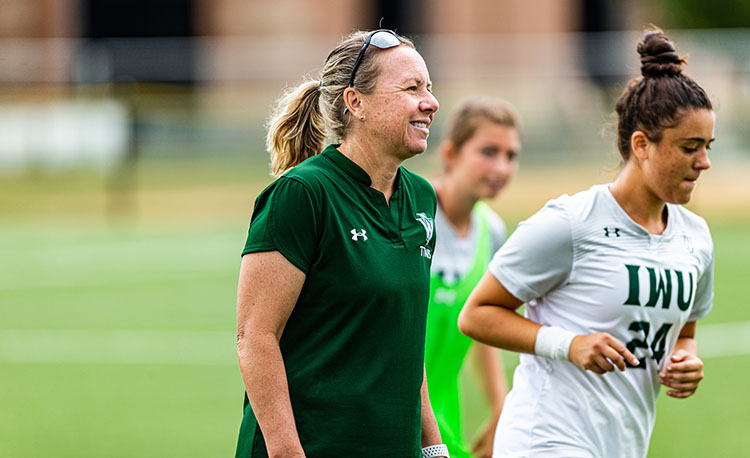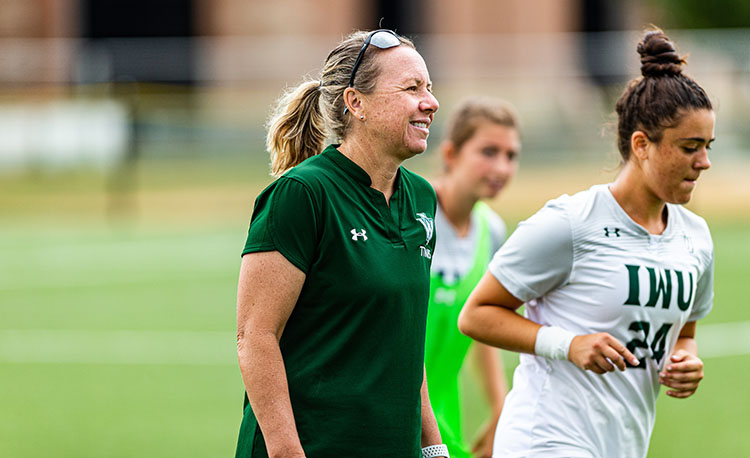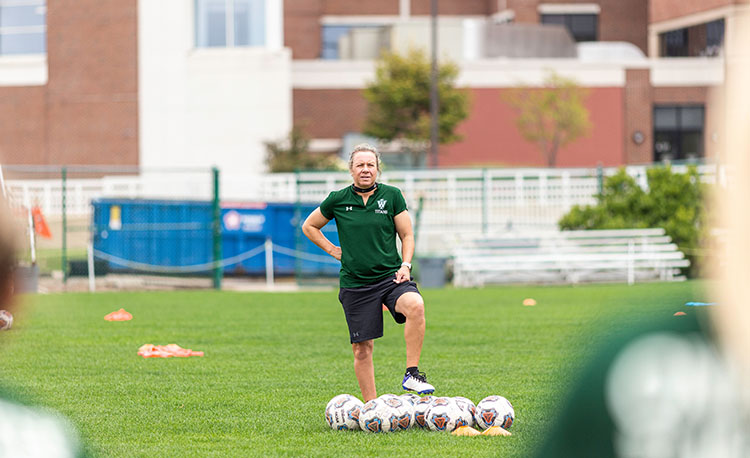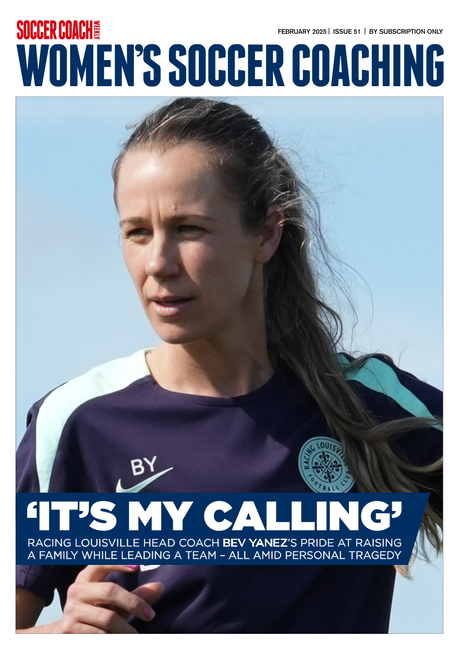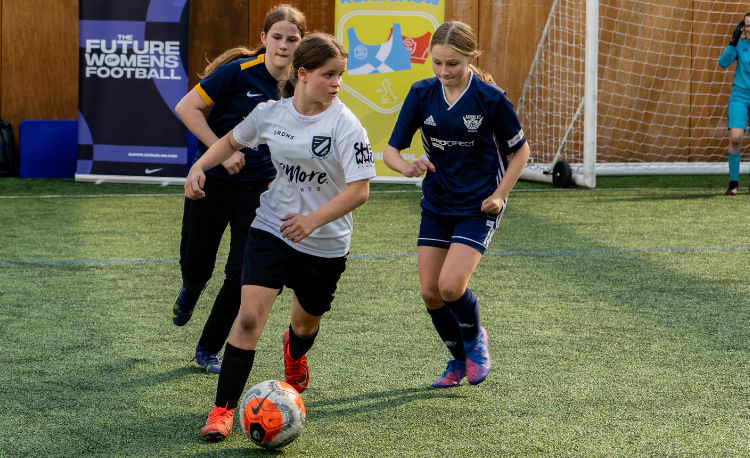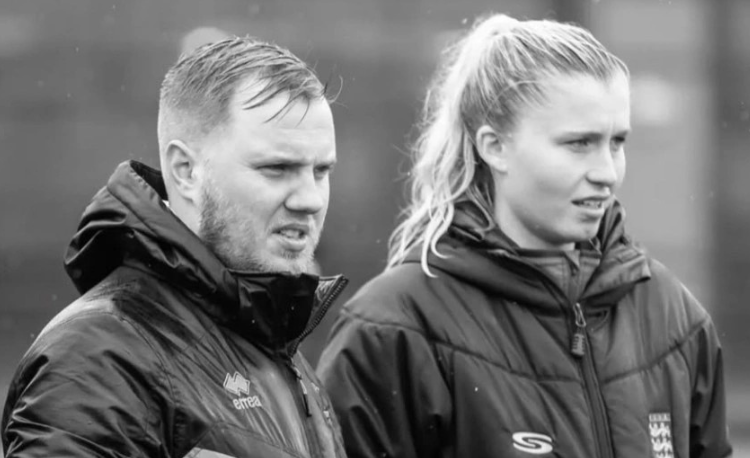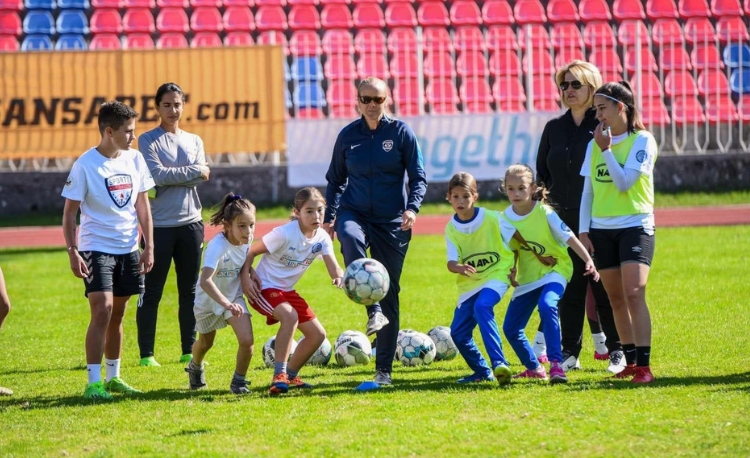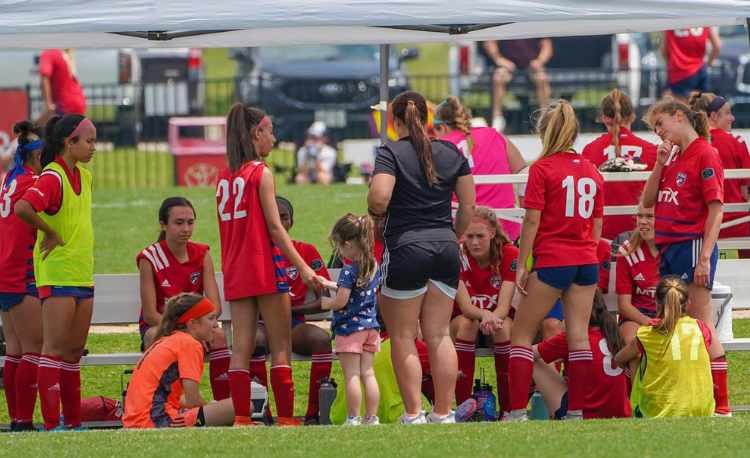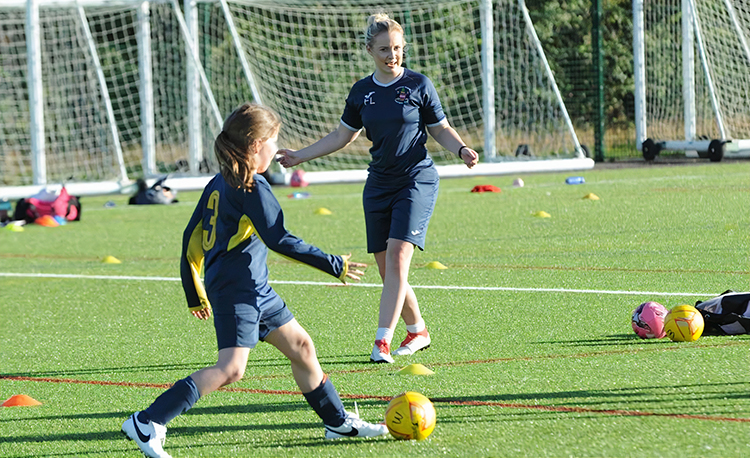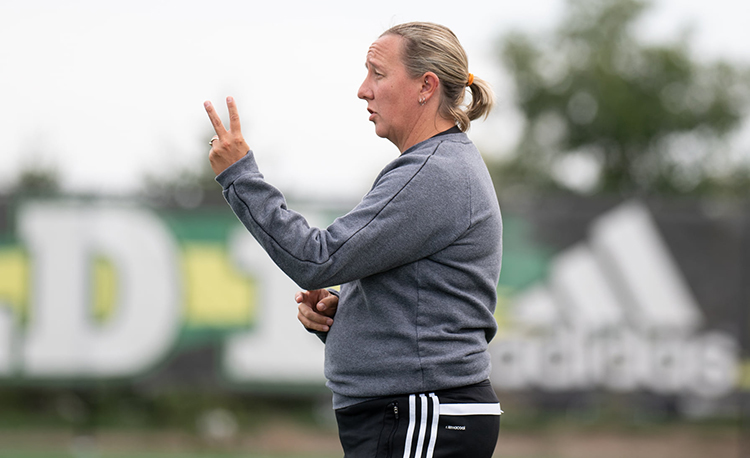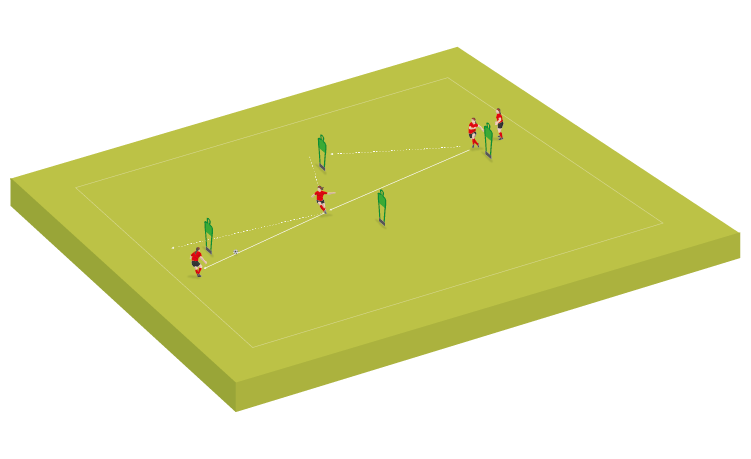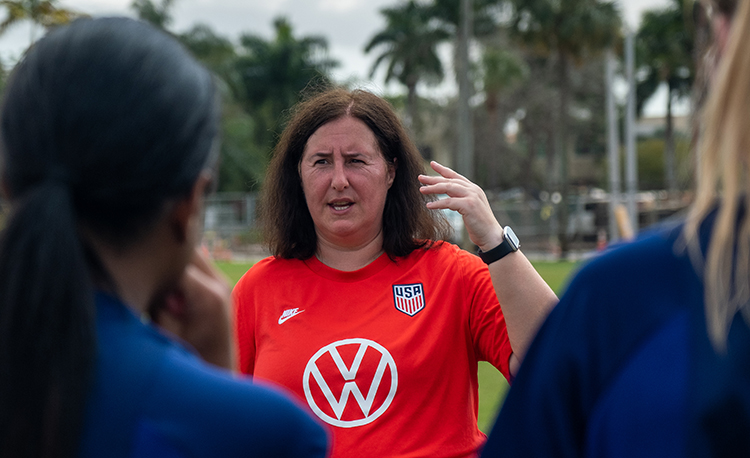You are viewing
1 of your 3 free articles
Keri Sanchez: How to get your next coaching role
In 26 years of coaching, Keri Sanchez has been both head coach and assistant, recruiter and applicant. Having just taken on a new job herself, she tells Steph Fairbairn what she looks for in a second-in-command
Keri Sanchez comes with a glowing resume – a standout playing career intertwined with, then followed by, a number of high-profile, successful coaching roles.
Sanchez’s first step into coaching came in 1996 with a call from the former goalkeeper coach of her college team, the North Carolina Tar Heels: Bill Steffen.
Steffen was going to restart the University of Oregon’s women’s soccer program, as head coach, and he invited Sanchez to be his assistant.
Having just graduated from the University of North Carolina with a BA in health and physical education, Sanchez put aside thoughts of potentially training to be a doctor, and followed Steffen to Oregon, where she spent almost seven years.
As I caught up with Sanchez, she was looking to hire an assistant of her own, after recently taking on her first NCAA Division I head coach role at Colorado College.
Among the qualities she was looking for in her second-in-command was someone who is good with people.
“We’re trying to maximise potential in our players,” Sanchez explains. “To do that, we have to be able to create a rapport with them. So you’re looking for someone who’s just a really good people person.”
Beyond that, she wants someone she can work well with on a personal level.
“I’m looking for somebody that can complement me,” she said. “It’s good for you to know what your strengths and weaknesses are as a coach.”
But what are the qualities such a coach has to complement?
“We have to create a rapport with players. You’re looking for a good people person...”
On appointing Sanchez in December last year, Lesley Irvine - vice-president and director of athletics at Colorado - described the new head coach’s ‘passion to work with student-athletes who are champions on the pitch and in the classroom’, and hailed her commitment, dynamism and experience of winning.
Sanchez did much of her winning at Claremont-Mudd-Scripps in Southern California where, during a 13-year run, she achieved a 148-92-30 record, making her the most successful coach in the program’s history. Her move there from Oregon in 2004 was a result of her desire to take the next step and secure a head coach job.
The job, she says, gave her the opportunity to “be a head coach and learn all the aspects that go along with running your own program”.
Having got “an itch” to get back to Division I and work with student athletes year-round, Sanchez returned to an assistant role in 2017, this time working under her college teammate Angela Kelly at the University of Texas.
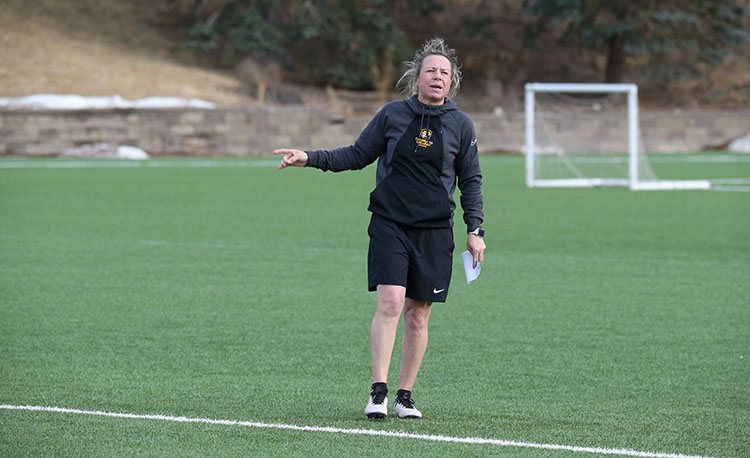
Her four years in Texas were followed by a head coach role at DIII program Illinois Wesleyan University, which she held for nine months - before the Colorado role and the opportunity to lead her own DI program, which she called ‘too enticing’, came up.
Sanchez, therefore, knows all about the differences between being a head coach and an assistant.
“I think in your assistant role, you are trying to do everything you can to help your head coach,” she said.
“The vision is set by your head coach, and you’re doing all of those little details in order to support that vision.
“If you’re preparing yourself to try to convert from an assistant to a head, I think one thing assistants don’t know is all the different duties the head coach is doing from an administrative side.
“Usually, the assistants are more hands-on with the soccer side of things, whereas a head coach has a lot more responsibilities from a compliance perspective - making sure all the program rules are being followed, making sure you know what your budget is and that you’re spending it correctly.
“All the player personnel ultimately drops on you, so if there’s an issue going on with a player off the field - whether it’s academic, medical or social - you’re dealing with that, maybe on a daily basis.
“So you’ve got to make sure you’re having communication not only with your assistants, but the support staff: the trainer, the social media, your SID [Sports Information Director], all the different touch points. A head coach is managing all of those different relationships as well.”
When the soccer season kicks off in the fall, the assistant standing beside Sanchez on the touchline will be Joshua Alcala, the successful candidate picked out from the resumes she was reviewing as we spoke.
Alcala has, like Sanchez, served as both an assistant and a head coach previously. And Sanchez sees her role as his new boss to not only work with him in the present, but prepare him for the future.
Related Files
On working with assistant coaches, she said: “I think it’s making sure you have established a good role for them and that they are re-evaluating that role, either on a seasonal or yearly basis, to make sure you are helping them get to where they want to go next in their coaching.
“If they’re wanting to be a head coach, or an assistant coach at a higher level, I’m making sure I’m helping them build their skillset.
“So it is giving them responsibility for some on-field coaching, giving them some side jobs, and helping them see what my day-to-day world is like if they want to be a head coach.
“Give them some ownership of those roles, and then have conversations with them, see how it’s going, what’s good and bad and where I can help them.
“If you’re good at your craft and continue to work hard, people are going to find you...”
"Sometimes, as you get to head coach, you forget to keep evaluating yourself, because you’re now at the top.
“So I think it’s always good to sit back and go, ‘What’s going well? What’s not going well? How can we tweak it?’. Good assistants will help you see not only their strengths and weaknesses, but your own - and so together you’ll grow.”
Before you get to that point of growing together with a head coach or assistant, you need to secure a role. The first step of which is finding the opportunity.
Sanchez’s tips for doing so? Firstly, network. She cites the United Soccer Coaches Convention as a great event for all coaches to attend.
Secondly, get as much experience coaching as possible, whether that is at soccer camps at big universities, in the club world, or doing individual training sessions. Thirdly, get your coaching licenses to show your commitment.
And fourthly? Do good work. “If you’re good at your craft and continue to work hard to do it, people are going to find you because you’re going to stand out,’ she said.
“HAVE THE CONFIDENCE, PUT YOURSELF OUT THERE” - KERI’S MESSAGE TO FEMALE COACHES LOOKING FOR THEIR NEXT ROLE
“If a women’s coaching position opens, women and men apply; if a men’s coaching position opens, only men apply.
‘So, have the confidence and put yourself out there. Even if you don’t get the job, you can reach out and say, ‘what can I be doing to get a look at a job like this?’.
“If you really want that opportunity, figure out a way to be selected for it.’
|
And once you’ve found an opportunity, how should you go about applying for it?
“Obviously a good clean resume, showing you have the applicable qualifications and experience the job is looking for,” Sanchez advises.
“You’ll get some people that apply who don’t have all the qualifications required.
“It doesn’t have to be long, but a well-thought-out cover letter also lets me know you’ve done some research, you understand the position or the school you’re applying for, that there’s a connection there and [explaining] why you would be a good fit.
“We don’t want to just know about you, but why would you be good for that specific job? Make sure you are highlighting that part of it.’ If you pass the application stage, an interview likely awaits. In it, Sanchez says:
“Expect to get asked questions. You will maybe get a curveball question in there.
“Always be ready to tell your story. I always like to hear people’s stories: How did you end up at the college you were at? What is your playing background? Who was a favorite coach of yours that impacted your life?
“I’ll ask about the strengths: what do you envision is a perfect role for you in a program? Be able to answer something like that. And definitely highlight what you’re going to bring from your individual skillset.
“If you’re really good at analytics, or really good at running a team culture, or leadership building sessions, make sure you know what you’re good at and that it comes across.
“Also, be able to share your personality because that’s a big part of it, too. We’re in a recruiting game, so you’ve got to be able to speak to players and parents and make sure you can sell the program for the head coach.”
Sanchez has not been asked to conduct a trial training session as an audition for a role, nor does she ask her applicants to do it, though she has been asked to break down a game and run a leadership session. But if she is watching somebody put on a session, she is looking for a few things.
“Energy and passion for what they’re doing, the ability to get the message across to the players and buy-in into the message, and the overall character of the person and how they relate,”
Sanchez said. “In terms of the training side - how is it set up? Is it running efficiently? Is there a point to each of the drills? At the end of the session, do the players know what it was about and what they were trying to learn?”
Above all, though, for Sanchez, it comes back to that people element. She said: “I’ll give credit to Anson Dorrance, my college coach, for this. He would bring us in at practice and the first thing he’d say would be ‘future coaches of America’.
“I tell the players, even those I’m recruiting who are 16 years old, that my job is to help them love the game so much that when I see them when they’re 40, they’re somehow still involved - whether it be as a coach, a player in an adult team, coaching your own kid, whatever it might be.”
PLAYING IN THE FIRST PRO LEAGUE WITH AKERS AND WAMBACH
A hard-working defender, Sanchez was capped by the US Women’s National Team 13 times and played in qualifying for the first-ever Fifa Women’s World Cup in 1991.
Sanchez said: “I was fortunate to play with some amazing players and it kind of spanned two generations, from some of the key contributors at the very beginning, like Michelle Akers (pictured), all the way to some of the more current ones like Abby Wambach.
“It’s given me some great memories, some really good friendships and has helped me become a better coach.”
|
Newsletter Sign Up
Newsletter Sign Up
Discover the simple way to become a more effective, more successful soccer coach
In a recent survey 89% of subscribers said Women's Soccer Coaching makes them more confident, 91% said Women's Soccer Coaching makes them a more effective coach and 93% said Women's Soccer Coaching makes them more inspired.
*includes 3 coaching manuals
Get Inspired
All the latest techniques and approaches
Women's Soccer Coaching offers proven and easy to use soccer drills, coaching sessions, practice plans, small-sided games, warm-ups, training tips and advice.
We've been at the cutting edge of soccer coaching since we launched Soccer Coach Weekly in 2007, creating resources for the grassroots youth coach, following best practice from around the world and insights from the professional game.
